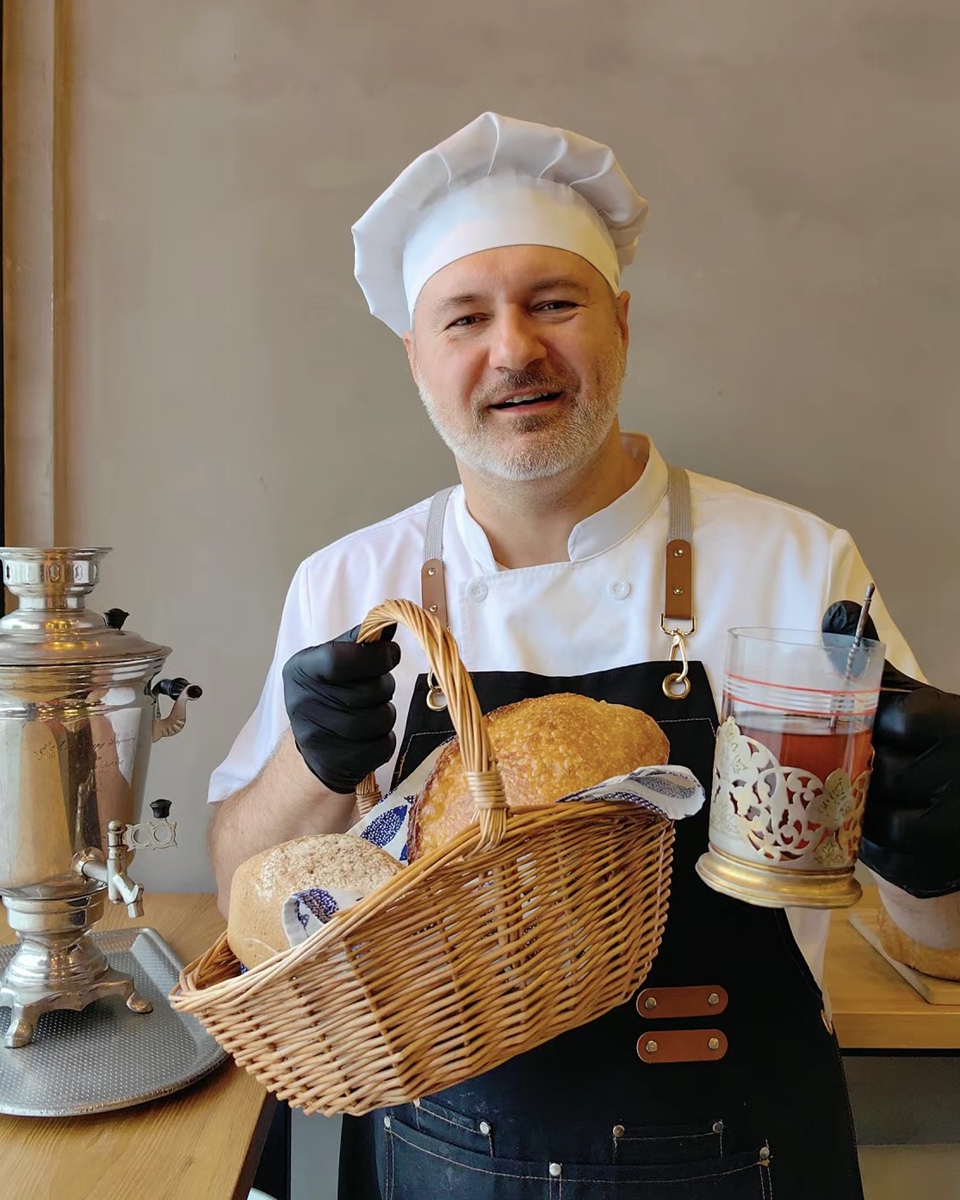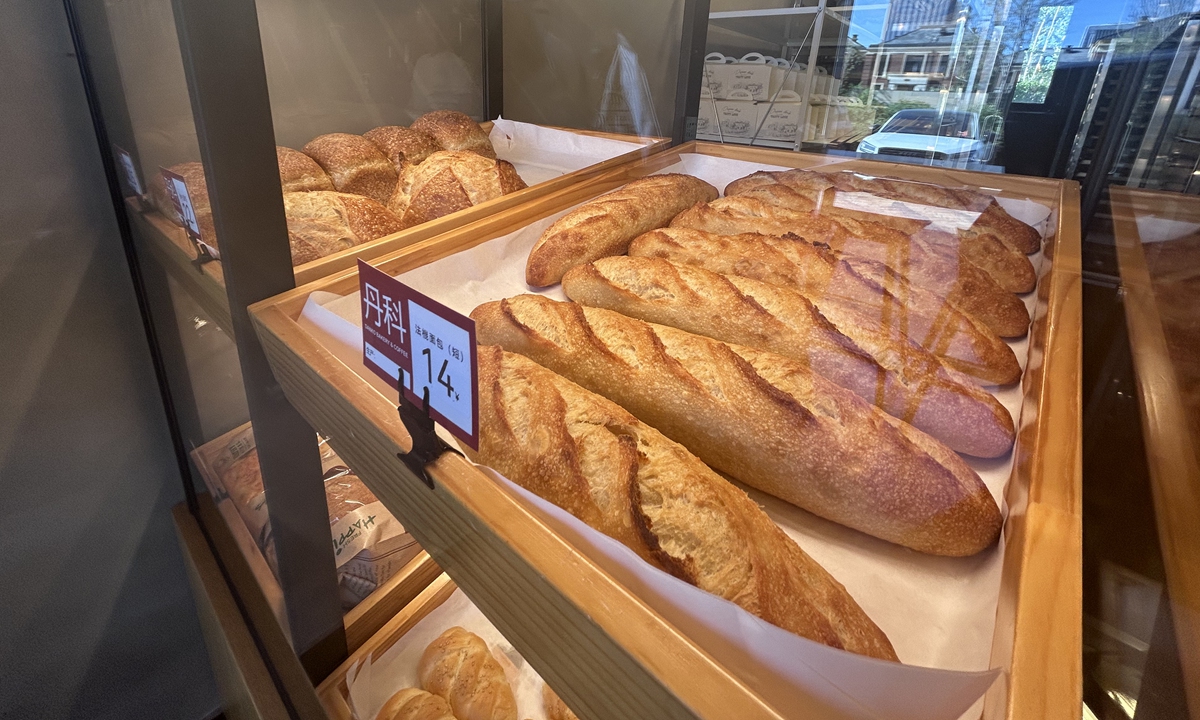
Russian baker Denis Danko and bread made at his bakery Photo: Zhang Weilan/GT
For decades, China and Russia have formed unique forms of culture because of their distinctive natural conditions, ways of life and special roles in the course of social history.
"The natural affinity between Chinese and Russian culture was the reason I decided to settle down in China," Denis Danko, a Russian baker living in Harbin, Northeast China's Heilongjiang Province, told the Global Times.
Donning a neat baker's uniform and exuding unique confidence and warmth as he stands next to his bustling workbench, the 45-year-old serves his Chinese clients with his eyes filled with energy and gentle smile.
Danko, a father of two, started his bakery business in Guangzhou, Guangdong Province nearly two decades ago. "I came to China in 2005, from Khabarovsk in the Russian Far East region, to pursue my dream," recalled Danko, adding that the natural closeness between China and Russia was the reason he decided to settle in China.
Danko has lived both in the northern and southern parts of the country and goes by the Chinese name Deng Jielun. He said that he loves Chinese culture, especially Chinese pop music. "My idol is Jay Chou [Zhou Jielun in pinyin] from the island Taiwan, so I gave myself the name Deng Jielun. I really enjoy going to his concerts."
Danko said the rapid and significant changes in China in recent years have attracted a growing number of foreigners who are eager to experience traditional Chinese culture while also introducing elements of their own lifestyle. Among these influences is the rising popularity of pastry culture in China.
For most Russian people, vodka is the "water of life." For Danko, however, bread is everything.
"In recent years, Chinese people's newfound and rising enthusiasm for artisanal bread has created a huge market demand for independent homemade bakeries; bread is a more day-to-day presence in the lives of ordinary Chinese people, and is deeply integrated into their diets. Eating bread and drinking coffee is a very natural choice for people," said Danko.

Photo: Zhang Weilan/GT
Persistence, passion"The most traditional Russian Black Breads are incredibly simple, made using just rye flour, water, salt, and a sourdough starter for leavening. Water, flour, and eggs - after being refined over time, they turn into a delicious loaf of bread. It's like magic happening right before your eyes," Danko said.
From Russia to China, the cross-border journey gives Danko a chance to pursue his dream of bakery. "Harbin is home to a large Russian population who have long enjoyed this staple food. This is one of the main reasons I moved from South China's Guangzhou to Harbin. In 2021, I opened my first ideal Russian traditional bakery in the city," he said.
The phrase "food is the first thing for people" applies to people all over the world. In Harbin, which is deeply influenced by Russian culture, in some large shopping malls, there is a sort of bread called "lieba" - a Chinese bread similar to Russian rye bread for sale. The demand for traditional Russian bread remains strong in the region.
The bakery, with an average daily revenue of more than 5,000 yuan ($703), has been embraced by both locals and tourists alike, becoming a must-visit culinary hotspot in Harbin. Its unique offerings allow visitors to immerse themselves in the charm of Russian culture.
Bread holds a deep symbolic significance in Russian culture, representing values such as respect, friendship, prosperity and celebration. Bread, in particular, is considered a vital part of daily life and is often seen as a gesture of utmost hospitality when offered to guests. It is a symbol of abundance and goodwill, embodying the spirit of unity and generosity in Russian society, Danko said.
"Bread acts as a bridge between Russian and Chinese people," Danko said.
Apart from enthusiasm and professionalism, the key element in making the bread is love. The large Russian community and deep-rooted habit of eating bread in Harbin, coupled with its Russian-style cuisine and profound history, undoubtedly make baked goods a must-have in the city.
'Second hometown'People-to-people exchanges and understanding of each other's culture are the basis of long-term good neighborliness.
In Danko's view, bread baking is not just a livelihood, but also a way to bring the people of China and Russia closer together. Many people in Harbin enjoy Russian bread, creating a warm and pleasant atmosphere that attracted Danko and his family to put down roots here. "Harbin is my second hometown," he said.
Apart from the prosperity of his business, he also found a sense of belonging in Harbin. "It is a Chinese city with a Russian feel. When I came here three years ago, it was such a strong feeling of intuition that pulled me to the city and it just seemed like the 'right thing to do,'" he said.
Its huge Russian influence has once gained Harbin the nickname "Oriental Moscow," or "Little Moscow." The city is well known for its historical Russian cultural influence and is also famous for its role as an important gateway in China-Russia trade today. For decades, Russian culture has had a significant impact on Harbin's architecture, education, literature, and art, making it a city with unique charm.
"Russian culture is not just about its physical architecture. It's quite embedded in people's lifestyles as well," Wu, an employee at Danko's bakery said. "It's not until I went traveling in Europe and Russia two years ago that I realized many of the things that we've been eating are actually Russian influenced."
"My wife and I are foreigners. Our children were born in China, so they are just like the ordinary Chinese people. For them, Chinese is their first language, then it is Russian," Dennis said. "From kindergarten, and elementary school, to future university, work, and marriage, my kids will all be here. Harbin is our home," Danko said.
According to Danko, his family does lots of business with Harbin, and many of his clients have also chosen to learn Russian as their second language, which Danko says is because, "economically and culturally we are the closest partners and friends. It's a very natural thing," he noted.





